
So maybe reading huge books to kill that lockdown time isn’t your thing. No worries; there are short story collections aplenty for the reader who wants a quick dose of fiction from time to time. Here, we’ve collected sixteen notable recently-published short story collections that were published by sixteen different independent presses — presses which are vital for supporting a diversity of voices in the literary sphere. Check out these collections below.
All descriptions of these books are taken from their respective publishers’ websites.
(P.S. For those who, on the contrary, want long reads, check these trilogies out.)
1. Love is Power, Or Something Like That: Stories, by A. Igoni Barrett (Graywolf Press, 2013)
In these wide-ranging stories, A. Igoni Barrett roams the streets with people from all stations of life. A man with acute halitosis navigates the chaos of the Lagos bus system. A minor policeman, full of the authority and corruption of his uniform, beats his wife. A family’s fortunes fall from love and wealth to infidelity and poverty, as poor choices unfurl over three generations. With humor and tenderness, Barrett introduces us to an utterly modern Nigeria, where desire is a means to an end, and love is a power as real as money.
2. Rain and Other Stories, by Mia Couto, translated by Eric M. B. Becker (Biblioasis, 2017)
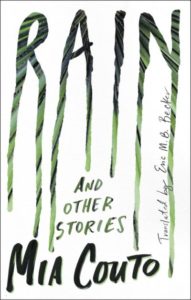
Published in the aftermath of Mozambique’s bloody civil war, Mia Couto’s third collection seeks out the places violence could not reach, the places where, the author writes, “every man is the same: pretending he’s here, dreaming of going away, and plotting his return.” Shifting masterfully between forms—creation tale to meditation, playful comedy to magical twist—these stories grapple with questions of what’s been lost and what can be reclaimed, what future exists for a country that broke the yoke of colonialism only to descend into internecine war, what is Mozambican and what is Mozambique. Following fishermen and fortune-tellers, widows and drunks, and one errant hippopotamus, this new translation of stories by the Man Booker-listed author of Confession of the Lioness rediscovers possibility and what it means to be reborn.
3. Dog Meat Samosa, by Stanley Gazemba (Regal House Publishing, 2019)
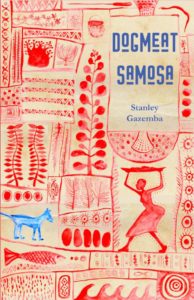
Nairobi, Kenya’s capital, is a rambling traffic-choked metropolis, bursting at the seams with people striving to earn a living on its mean streets. While Nairobi has every appearance of a fast-growing, modern African city with the mushrooming skyscrapers and superhighways, the city possesses a dark underbelly. Dog Meat Samosa delves into the bowels of Nairobi’s crowded urban backstreets to paint a gritty picture of its underworld, to describe the human experience within this once glorious “City in the Sun” that has since metamorphosed into a cutthroat hustlers’ paradise.
4. The Cape Cod Bicycle War: and Other Stories, by Billy Kahora (Huza Press/Ohio University Press, 2019/2020)
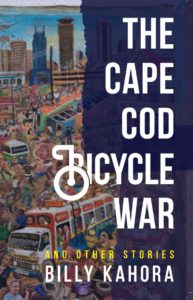
Each of the realistic worlds Billy Kahora brings us in the short stories and novella that make up The Cape Cod Bicycle War and Other Stories explores the tensions and transitions of characters moving between youthful folly and a precarious adulthood. In the title story, immigrant workers with varying ambitions work at a Wendy’s in wintry Cape Cod. Sharing one house, they must also share, or rather compete for, bicycles—crucial transportation—which are in short supply. In other stories, a young man caught between a broken family and political violence befriends an aged gorilla in a Nairobi zoo; a pastor struggles to come to terms with the arrest of his brother, who is suspected of terrorism; and a dissolute bank employee on a serious bender returns to work to face a review board.
5. The Quarter, by Naguib Mahfouz, translated by Roger Allen (Saqi Books, 2019)
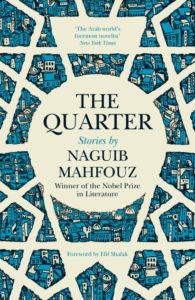
Meet the people of Cairo’s Gamaliya quarter. There is Nabqa, son of Adam the waterseller who can only speak truths; the beautiful and talented Tawhida who does not age with time; Ali Zaidan, the gambler, late to love; and Boss Saqr who stashes his money above the bath. A neighbourhood of demons, dancing and sweet halva, the quarter keeps quiet vigil over the secrets of all who live there. This collection by pre-eminent Egyptian writer Naguib Mahfouz was recently discovered among his old papers. Found with a slip of paper titled ‘for publishing 1994’, they are published here for the first time. Resplendent with Mahfouz’s delicate and poignant observations of everyday happenings, these lively stories take the reader deep into the beating heart of Cairo.
6. Manchester Happened, by Jennifer Nansubuga Makumbi (Oneworld, 2019)
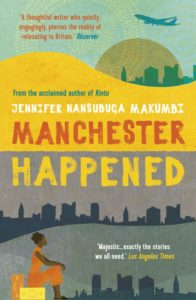
If there’s one thing the characters in Jennifer Makumbi’s stories know, it’s how to field an uncomfortable question. “Let me buy you a cup of tea…what are you doing in England?” “Do these children of yours speak any Luganda?” “Did you know that man Idi Amin?” But perhaps the most difficult question of all is the one they ask themselves: ‘You mean this is England?” Told with empathy, humour and compassion, these vibrant, kaleidoscopic stories re-imagine the journey of Ugandans who choose to make England their home. Weaving between Manchester and Kampala, this dazzling collection will captivate anyone who has ever wondered what it means to truly belong.
7. Thirteen Months of Sunrise, by Rania Mamoun, translated by Elisabeth Jaquette (Comma Press, 2019)
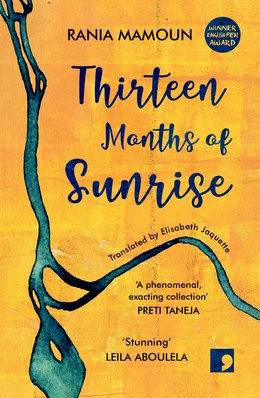
A young woman sits by her father’s deathbed, lamenting her failure to keep a promise to him. A struggling writer walks every inch of the city in search of inspiration, only to find it is much closer than she imagined. A girl collapses from hunger at the side of the road and is rescued by the most unlikely of saviours. In this powerful, debut collection of stories, Rania Mamoun expertly blends the real and imagined to create a rich, complex and moving portrait of contemporary Sudan. From painful encounters with loved ones to unexpected new friendships, Mamoun illuminates the breadth of human experience and explores, with humour and compassion, the alienation, isolation and estrangement that is urban life.
8. Shut Up You’re Pretty, by Téa Mutonji (Arsenal Pulp Press, 2019)
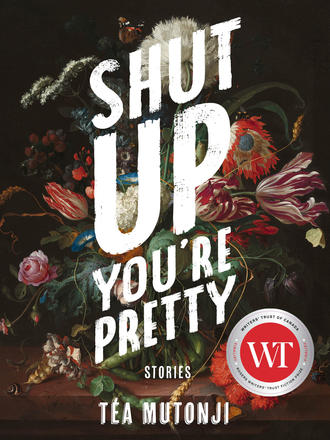
In Tea Mutonji’s disarming debut story collection, a woman contemplates her Congolese traditions during a family wedding, a teenage girl looks for happiness inside a pack of cigarettes, a mother reconnects with her daughter through their shared interest in fish, and a young woman decides to shave her head in the waiting room of an abortion clinic. These punchy, sharply observed stories blur the lines between longing and choosing, exploring the narrator’s experience as an involuntary one. Tinged with pathos and humour, they interrogate the moments in which femininity, womanness, and identity are not only questioned but also imposed.
9. Minutes of Glory: and Other Stories, by Ngũgĩ wa Thiong’o (The New Press, 2019)
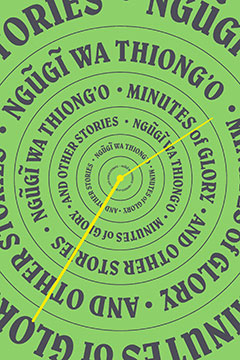
Ngũgĩ wa Thiong’o, although renowned for his novels, memoirs, and plays, honed his craft as a short story writer. From “The Fig Tree” (“Mugumo” in this collection), written in 1960, his first year as an undergraduate at Makerere University College in Uganda, to the playful “The Ghost of Michael Jackson,” written as a professor at the University of California, Irvine, these collected stories reveal a master of the short form. Covering the period of British colonial rule and resistance in Kenya to the bittersweet experience of independence—and including two stories that have never before been published in the United States— Ngũgĩ’s collection features women fighting for their space in a patriarchal society; big men in their Bentleys who have inherited power from the British; and rebels who still embody the fighting spirit of the downtrodden. One of Ngũgĩ’s most beloved stories, “Minutes of Glory,” tells of Beatrice, a sad but ambitious waitress who fantasizes about being feted and lauded over by the middle-class clientele in the city’s beer halls. Her dream leads her on a witty and heartbreaking adventure.
10. Speak Gigantular, by Irenosen Okojie (Jacaranda Books, 2016)
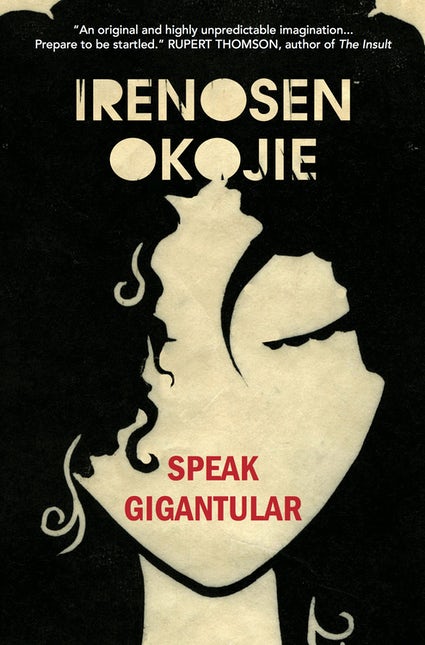
Okojie’s collection of stories are captivating, erotic, enigmatic and disturbing. Irenosen Okojie’s gift is in her understated humour, her light touch, her razor-sharp assessment of the best and worst of humankind, and her unflinching gaze into the darkest corners of the human experience. Okojie has created a world with errant Londoners caught between here and the hereafter, where insensitive men cheat on their mistresses and can only muster enough interest to fall for one- dimensional poster girls and where brave young women attempt to be erotically empowered at their own peril. Sexy, serious and at times downright disturbing, this brilliant debut collection sizzles with originality.
11. The Magic Lamp: Dreams of Our Age, by Ben Okri, illustrated by Rosemary Clunie (Head of Zeus, 2017)
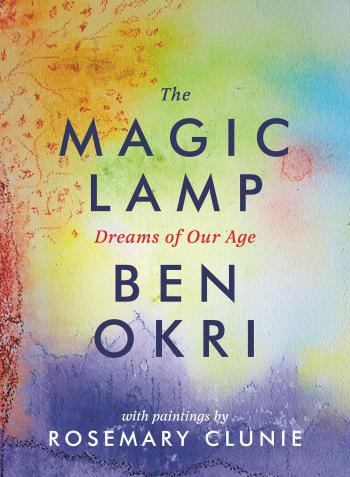
Twenty-five stories, twenty-five paintings, five years to write, ten years to paint. This is an extraordinary collaboration between artist and artist: the Booker Prize-winning writer Ben Okri and the painter Rosemary Clunie. Together they have created a world, and peopled it with dreams. Twenty-five fairy tales for adults, these narratives are a response to our times, informed by our world but not limited by it, imaginative, enchanting, haunting – both prescient and prophetic. Twenty-five original paintings, beautiful, playful, intimate, dreamlike, these works pull you in to a land of colour and vision. Who can say which came first, the word or image, when both grew together out of a long friendship and a creative symbiosis. What if Calvino and Magritte had combined inspiration? What if we could see our world again with a child’s eyes? What if there really is a magic lamp?
12. breach, by Olumide Popoola and Annie Holmes (Peirene Press, 2016)

The eight short stories in this collection explore the refugee crisis through fiction. They give voice to the hopes and fears of both sides. Dlo and Jan break into refrigerated trucks bound for the UK. Marjorie, a volunteer, is happy to mingle in the camps until her niece goes a step too far. Mariam lies to her mother back home. With humour, insight and empathy, breach tackles an issue that we can no longer ignore. In breach, the authors beautifully capture a multiplicity of voices – refugees, volunteers, angry citizens – whilst deftly charting a clear narrative path through it all. Each story is different in tone, and yet they complement one another perfectly. Taken as a whole, this stands as an empathetic and probing collage, where the words ‘home’, ‘displacement’ and ‘integration’ come to mean many things as the collection progresses to a moving finale.
13. Chatsworth, by Pravasan Pillay (Dye Hard Press, 2019)
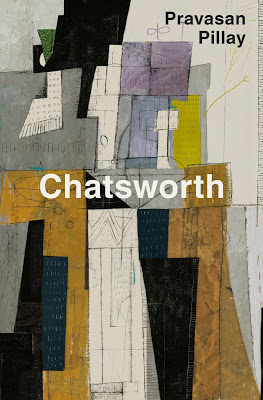
Chatsworth is Pravasan Pillay’s debut short fiction collection and consists of eleven stories set in the sprawling township of Chatsworth, Durban. The stories are populated mostly by working-class characters who all, in one way or the other, find themselves on the margins of their community. There is an elderly mother and her dependent obese daughter who must fend for themselves; an angst-filled twelve-year-old girl who secretly chain smokes late at night; a tearful man who is incapable of passing his driving test; an albino girl who attains a fragile popularity in high school; a young woman who – against her father’s wishes – falls in love with an immigrant; a seemingly placid pensioner who hides a shockingly violent side; and a pair of girls who bond over a love letter and hair bleach, among others. The stories present sensitive yet unsentimental portraits of these characters, in prose that is spare and unadorned. Pillay additionally displays a remarkable ear for dialogue, and faithfully captures much of the nuance of Durban-Indian English. Chatsworth is a gentle and moving book about growing up, being different, but also about failing at adulthood.
14. Incomplete Solutions, by Wole Talabi (Luna Press Publishing, 2019)
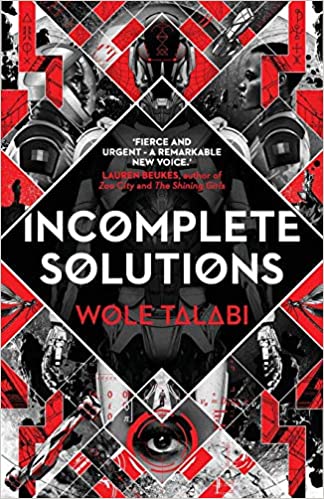
An elderly woman in early 22nd century Lagos is called in to help test the artificial intelligence built from her genius mother’s mind, but all is not as it seems in the Nommo-award winning story, “The Regression Test”. Exiled from Earth for a crime of passion, a young man must learn to survive a barely habitable prison planet and come to peace with his past in “Polaris”. “Wednesday’s Story”, nominated for the 2018 Caine Prize, is at once a retelling of nursery rhymes and folklore and a meta-fictional meditation on the mechanics, art and power of storytelling. In the novella “Incompleteness Theories”, an international team, led by a Nigerian physicist, try to invent teleportation technology with haunting, unforeseen results. From the bustling streets of Lagos to the icy moons of Jupiter, this debut collection of twenty stories from the vivid imagination of the award-winning Wole Talabi explores what it means to be human in a world of accelerating technology, diverse beliefs, and unlimited potential, from a uniquely Nigerian perspective.
15. Better Never Than Late, by Chika Unigwe (Cassava Republic Press, 2019)

Better Never Than Late charts the unconventional lives and love affairs of a group of Nigerian migrants, making their way in Belgium. The collection is centred around Prosperous and her husband Agu, and the various visitors who gather at their apartment each week. These interconnected stories explore their struggles and triumphs, from unhappy marriages (of convenience or otherwise), to the pain of homesickness, and the tragic paradox in longing to leave Nigeria so that you may one day return to it.
16. The Lion’s Binding Oath: and Other Stories, by Ahmed Ismail Yusuf (Catalyst Press, 2018)
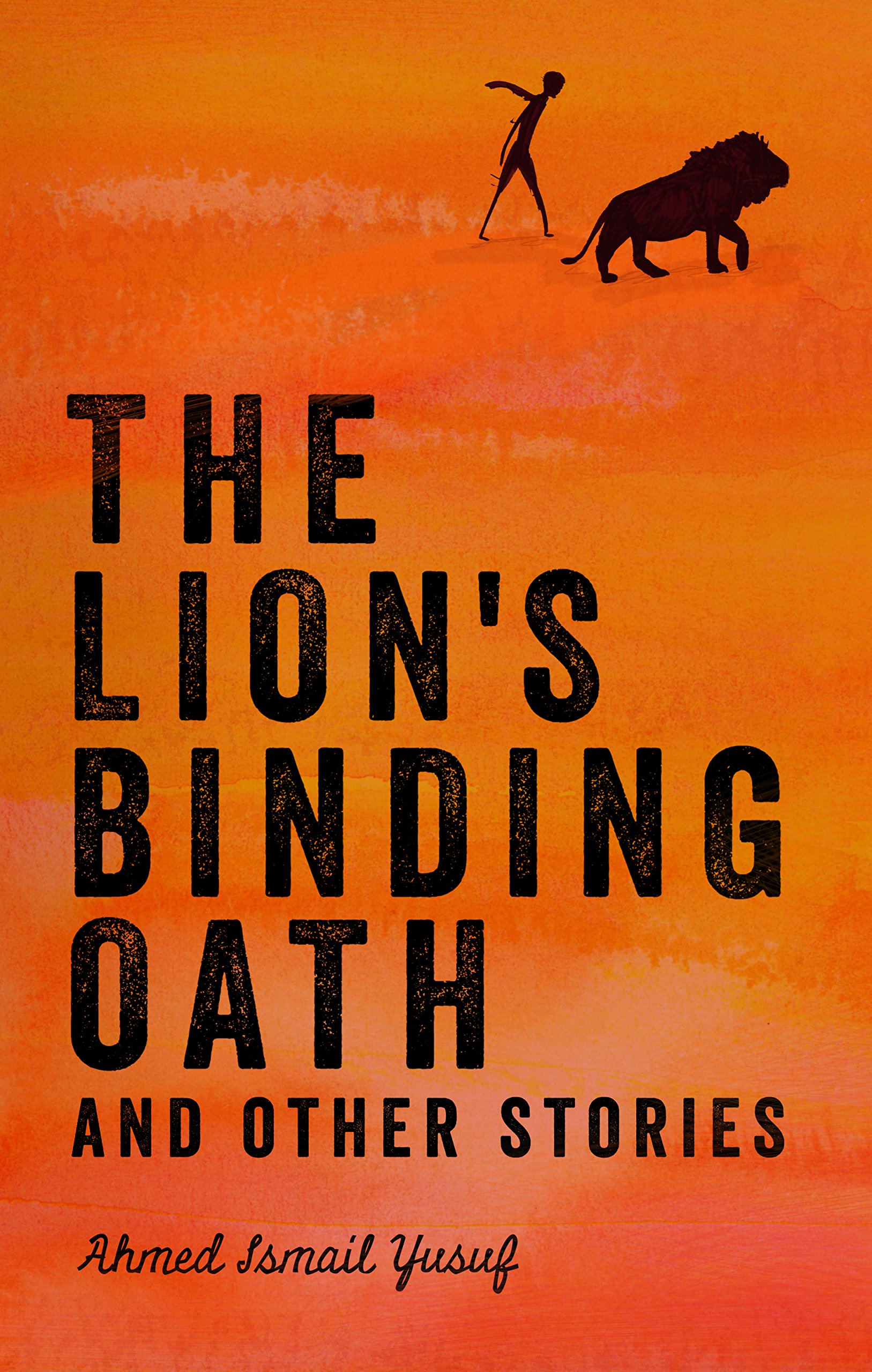
Religious and ethnic conflict may be the Horn of Africa’s most enduring recent legacy. But beneath its recent history of war and displacement lies human stories—families, clans, lovers, neighbors, and friends, all bound together through common cultural, religious, and historical ties. The Lion’s Binding Oath, Ahmed Ismail Yusuf’s collection of short stories, introduces readers to the people of Somalia and their struggles: their humanity, faith, identity, friendship, and family bonds, as whispers of war grow louder around them. Through stories that span the years before and during Somalia’s civil war, Yusuf weaves together Somalia’s political, social, and religious conflicts with portrayals of the country’s love of poetry, music, and soccer. Yusuf’s collection is a powerful examination of love and resilience in a country torn apart by war, and written with deep compassion for the lives of its characters.








Chinedu Isaac Ezeala January 07, 2021 16:06
The major challenge young writers have in these times are access to publishing companies and proper publicity. The availability of these in decades past gave rise to the likes of Chinua Achebe (of blessed memory), Ngugi Wa'thiong, Peter Abraham, to mention a few. How can these new crop of writers be helped? We have the talents, believe me. To see my writings, click www.neduisaac.blogspot.com